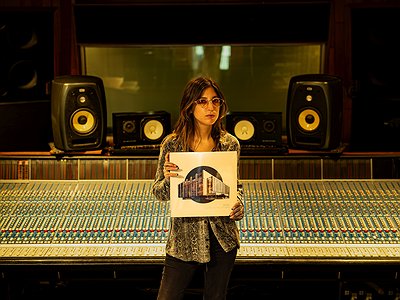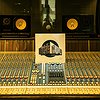Name: Emme Moises
Nationality: Argentinian
Occupation: Producer, sound artist, event technician
Current Release: Emme Moises's Talking To The Spheres was released one year ago via Modularfield. In this feature, we continue our conversation with Emme. For more of her thoughts about production, read our earlier Emme Moises interview.
If you enjoyed these thoughts by Emme Moises and would like to stay up to date with her music, visit her on Instagram, Soundcloud, and bandcamp.
Where does the impulse to create something come from for you? What role do often-quoted sources of inspiration like dreams, other forms of art, personal relationships, politics etc play?
I've asked myself that question a lot. The impulse to create is such an internal, indescribable need, because it's not easy to choose the path of art. There are oh so many obstacles and difficulties, swimming against the current.
So I think the impulse comes from an instinct very deep inside of us that will keep you pushing forward and going, because you want, with all the fibers of your being, to express yourself through music and adopt the lifestyle that comes when choosing to become an artist.
Everything that you see, hear, live, consume ends up somehow internalized in you, and will come out when you are expressing creatively. For me, it is reading most of all and the new life experiences that randomly (or carefully thought) happen.
Without a life outside the studio, there's is no possible creation inside the studio. Art is social and it is political. It's all connected.
For you to get started, do there need to be concrete ideas – or what some have called a 'visualisation' of the finished work? What does the balance between planning and chance look like for you?
For me yes, there has to be a visualization of where the composition is going, even where the live performance is going, where is it going to be played, which sound system, etc.
It's not the same making a remix for digital streaming as it is making a conceptual album for vinyl, or playing live ambient with hardware or dance music with a computer. I see the end result, draw a path in my mind and start walking towards it.
In between, on the journey, things may happen and occur that were not expected, and I embrace them (if I feel it resonates to where I was going). Chance and randomness are beautiful things, a detune, a slight latency, a distortion while recording, throwing the entire project into the trash and starting again blank - all of this is precious to me, makes music a real human experiment and expression.
Is there a preparation phase for your process? Do you require your tools to be laid out in a particular way, for example, do you need to do 'research' or create 'early versions'?
I like to have a clean workspace. Not necessarily organized but clean and with the proper light, maybe darker, maybe brighter. And a bottle of water close to me.
Part of my process is just turn on a synth, patch it to an fx, turning on another, no it doesn't fit, drag a sample, resample, no again, go back to the first synth, try another effect, record, chop, reverse, record again … Yes, sometimes it is as chaotic as that.
It's important for me to create drafts, because I mostly always start experimenting. I almost never turn everything on and get super serious to work. I like to play a bit, jam and then get to the specifics of the task.
If I start an idea, 95% of the time, I finish it. Maybe I won't use it or don't like it. But if I start I see things all the way through.
Often, while writing, new ideas and alternative roads will open themselves up, pulling and pushing the creator in a different direction. Does this happen to you, too, and how do you deal with it? What do you do with these ideas?
If another idea strikes that is in a very different direction from where I was planning to go, I record it and save the project with a code name to come back to it later.
It's good to leave things for a while before listening back, because in the moment it may seem great but with fresh ears it may be something else, ahah.
There are many descriptions of the creative state. How would you describe it for you personally? Is there an element of spirituality to what you do?
Completely. There is spirit, mind and body. Heart and feelings. Nirvana y satori.
The creative state puts the entire self into another dimension of being, where the biggest challenge is to overcome who you are, to be able to give yourself completely to the experience. I think of it as small transformational moments, I'm never the same after a creative period, and I am always elevated, even in the moments where things don't work out as expected or you feel frustrated and dumb.
There is a profound learning and an evolution within the self.
Especially in the digital age, the writing and production process tends towards the infinite. What marks the end of the process? How do you finish a work?
Deadlines. I love them.
I go into full intense, don't think of anything else mode, and work until it is finished at the time that was requested. Either for an external reason, or my personal pre established time.
Lately I am learning to specify a longer time than needed, to have some buffer and not stress out too much.
What's your take on the role and importance of production, including mixing and mastering for you personally? How involved do you get in this?
I consider all stages of production extremely important. Mixing is not a favorite activity of mine, but I try to deliver a clean, quite approximate mix for the engineer to work on. I do a sort of mix while composing always, it is the best way to have a real sense of where the song is going and which frequencies may be too full or lacking.
I'm quite picky and have a clear idea of how I want the end result to sound like. So I give a lot of comments during the mixing / mastering process. But I also listen a lot to the advice and ideas of the mixing / mastering engineers, They know waaay better than me about detailed aspects of sound. I get so involved in the piece while creating it, that is important for me to have another set of trained ears for the mix/master process.
Almost all the mixes from my music are made by my husband, who is a sound engineer and knows my approach to sound quite well. Mastering depends on the format to be released, digital, tape or vinyl and I always outsource this, with incredibly good and happy results and experiences.
After finishing a piece or album and releasing something into the world, there can be a sense of emptiness. Can you relate to this – and how do you return to the state of creativity after experiencing it?
So far I haven't felt a sense of emptiness after releasing something into the world.
I guess before putting something out I dedicate a lot of time to refining and achieving the best possible result which sometimes is limited by time, deadlines and knowledge in that period of my life. Since I'm always evolving, I try not to feel that I could have done something better or improved the release. It is what it is (or what is was).
A sonic composition is only completed when it reaches someone else’s ears, and then it sort of doesn't belong to me anymore. I'm always happy to release and get feedback and a sense of how that piece worked out in the world, how it was perceived by others.
After creating an album, I do need to take time off from composing. But then I turn to creating for live performances, which is a different state of creativity for me, that always lifts me up and presents new challenges or situations to solve.
In a way, I'm always motivated to make music. Both in the most difficult moments of life or the more relaxed and happy ones. I'm always making / listening to / studying music.





